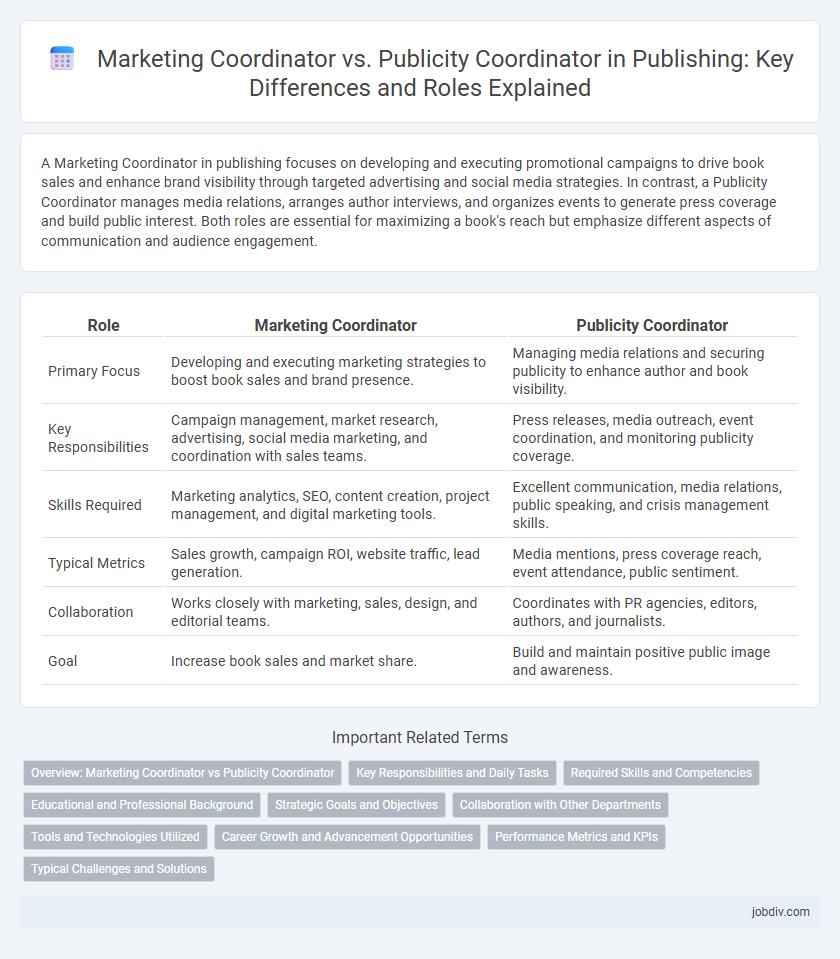A Marketing Coordinator in publishing focuses on developing and executing promotional campaigns to drive book sales and enhance brand visibility through targeted advertising and social media strategies. In contrast, a Publicity Coordinator manages media relations, arranges author interviews, and organizes events to generate press coverage and build public interest. Both roles are essential for maximizing a book's reach but emphasize different aspects of communication and audience engagement.
Table of Comparison
| Role | Marketing Coordinator | Publicity Coordinator |
|---|---|---|
| Primary Focus | Developing and executing marketing strategies to boost book sales and brand presence. | Managing media relations and securing publicity to enhance author and book visibility. |
| Key Responsibilities | Campaign management, market research, advertising, social media marketing, and coordination with sales teams. | Press releases, media outreach, event coordination, and monitoring publicity coverage. |
| Skills Required | Marketing analytics, SEO, content creation, project management, and digital marketing tools. | Excellent communication, media relations, public speaking, and crisis management skills. |
| Typical Metrics | Sales growth, campaign ROI, website traffic, lead generation. | Media mentions, press coverage reach, event attendance, public sentiment. |
| Collaboration | Works closely with marketing, sales, design, and editorial teams. | Coordinates with PR agencies, editors, authors, and journalists. |
| Goal | Increase book sales and market share. | Build and maintain positive public image and awareness. |
Overview: Marketing Coordinator vs Publicity Coordinator
A Marketing Coordinator develops and implements strategies to promote books and increase sales through market research, advertising campaigns, and social media management. A Publicity Coordinator focuses on managing media relations, securing book reviews, organizing author events, and generating press coverage to build public awareness. Both roles collaborate closely but prioritize different tactics to enhance a book's visibility and reach.
Key Responsibilities and Daily Tasks
A Marketing Coordinator manages campaign development, digital content creation, market research, and analytics to drive book sales and brand presence. A Publicity Coordinator focuses on media relations, press release distribution, event planning, and securing reviews and interviews to generate buzz and publicity for authors and titles. Both roles collaborate with editorial and sales teams but differ in targeting marketing strategy versus media outreach and public engagement.
Required Skills and Competencies
Marketing Coordinators require strong skills in market analysis, campaign management, digital marketing tools, and customer segmentation to effectively promote publishing products and track performance metrics. Publicity Coordinators must excel in media relations, press release writing, event planning, and relationship building with influencers and journalists to maximize book visibility and engagement. Both roles demand excellent communication, project management, and strategic planning abilities tailored to the publishing industry's promotional goals.
Educational and Professional Background
Marketing Coordinators in publishing typically have degrees in marketing, communications, or business, with coursework emphasizing market research, digital marketing, and brand management. Publicity Coordinators usually hold qualifications in journalism, public relations, or media studies, focusing on media outreach, event planning, and press release writing. Both roles benefit from internships or experience in publishing but require distinct skill sets tailored to marketing strategies or public engagement and media relations.
Strategic Goals and Objectives
Marketing Coordinators in publishing focus on driving sales growth through strategic campaign planning, market research, and audience targeting to align with overall business goals. Publicity Coordinators prioritize enhancing author visibility and book awareness by coordinating media relations, organizing events, and securing press coverage to meet the objective of building a strong public presence. Both roles contribute to the publisher's success by executing targeted initiatives that support brand positioning and audience engagement.
Collaboration with Other Departments
Marketing Coordinators collaborate closely with sales, design, and content teams to develop campaigns that drive book sales and brand visibility. Publicity Coordinators work alongside editorial, events, and media relations departments to secure press coverage and organize author appearances. Both roles require seamless interdepartmental communication to align marketing strategies with publicity efforts for successful book launches and sustained audience engagement.
Tools and Technologies Utilized
Marketing Coordinators utilize digital marketing platforms such as Google Analytics, HubSpot, and social media management tools like Hootsuite to analyze campaign performance and optimize audience engagement. Publicity Coordinators rely on media monitoring software including Cision and Meltwater to track press coverage and manage relationships with journalists and influencers. Both roles integrate project management tools like Trello or Asana to coordinate strategies and deadlines efficiently within publishing campaigns.
Career Growth and Advancement Opportunities
Marketing Coordinators focus on developing and executing promotional campaigns to boost book sales and brand awareness, offering opportunities to advance into marketing management or digital strategy roles. Publicity Coordinators specialize in media relations and event planning to generate press coverage, with career growth leading toward senior publicity or communications director positions. Both roles provide valuable experience in the publishing industry, but Marketing Coordinators often have broader growth prospects due to their involvement in diverse marketing channels and analytics.
Performance Metrics and KPIs
Marketing Coordinators track performance metrics such as campaign ROI, lead generation, and conversion rates to optimize overall marketing strategies. Publicity Coordinators focus on KPIs like media impressions, press release pickup, and share of voice to measure brand visibility and public engagement. Both roles rely on data-driven insights, but Marketing Coordinators prioritize sales impact while Publicity Coordinators emphasize audience reach and media coverage.
Typical Challenges and Solutions
Marketing Coordinators often face challenges in aligning promotional strategies with target audience preferences and measuring campaign effectiveness, which can be addressed by leveraging data analytics and customer feedback tools. Publicity Coordinators struggle with securing consistent media coverage and managing public perception, solutions include building strong media relationships and utilizing crisis communication plans. Both roles benefit from agile adaptation to market trends and integrated communication platforms to enhance overall campaign impact.
Marketing Coordinator vs Publicity Coordinator Infographic

 jobdiv.com
jobdiv.com